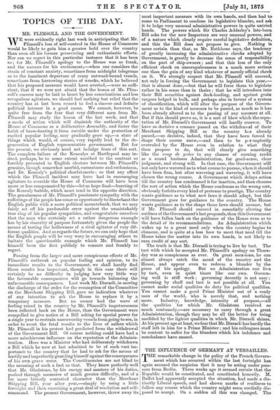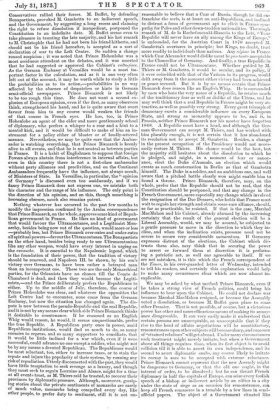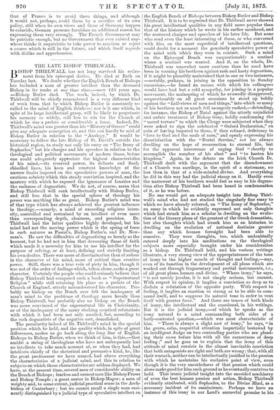THE INFLUENCE OF GERMANY AT VERSAILLES.
THE remarkable change in the policy of the French Govern- ment which has occurred within the last fortnight has again aroused the suspicion that it may be acting under pres- sure from Berlin. Three weeks ago it seemed certain that the Republic would be constituted, and constituted honestly. M. Buffet had apparently accepted the situation, had made a dis- tinctly Liberal speech, and had shown marks of readiness to follow any course which the country might seem cordially dis- posed to accept. On a sudden all this was changed. The
Conservatives rallied their forces. M. Buffet, by defending reasonable to believe that a Czar of Russia, though he did en- Bonapartists, provoked M. Gambetta to an indiscreet speech, and the Government, by suggesting a long recess and claiming the right to refuse dissolution if inexpedient, postponed the Constitution to an indefinite date. M. Buffet seems even to take pleasure in taunting the late majority, and his hot remark to M. Chxistophle that he had not been his friend hitherto, and should not be his friend hereafter, is accepted as a sort of declaration of war to the Left Centre. So sudden a change roused suspicion ; it was noted that Prince Hohenlohe was a most assiduous attendant on the debates, and it was asserted that he had suggested or approved the Cabinet's volte-face. As the German Embassy at Versailles would be a most im- portant factor in the calculation, and as it is one very often left out of the account, it may be worth while to study a little the probabilities as to its action,—probabilities in no way affected by the absence of despatches or hints in German semi-official newspapers. Prince Bismarck is not likely to be too rough this time. He does not want a second ex- plosion of European opinion, even if the first, as many observers think, strengthened his hand, and he is quite aware that overt favour from him to any course would weaken the friends of that course in French eyes. He has, too, in Prince Hohenlohe an agent of the elder and more gentlemanly school of diplomacy, who prefers a whisper to a roar and a hint to a mental kick, and it would be difficult to make of him an in- strument for a policy either of bluster or of loudly-uttered menace. Nevertheless, we may be quite sure that the Ambas- sador is watching everything, that Prince Bismarck is keenly alive to all events, and that he is not neutral as between parties in France. It is a habit of Englishmen to suppose that foreign Powers always abstain from interference in internal affairs, but even in this country there is not a first-class ambassador without party alliances and proclivities, and on the Continent Ambassadors frequently have the influence, not always occult, of Ministers of State. In Versailles, in particular, the" opinion of Germany" is discussed even too assiduously, and if we fancy Prince Bismarck does not express one, we mistake both his character and the range of his influence. The only point is the direction of his opinion, and on this, though something is becoming obscure, much also remains patent.
Nothing whatever has occurred in the past few months to modify the impression confirmed by the Arnim correspondence that Prince Bismarck, on the whole, approves some kind of Repub- lican government'in France. He likes no kind of government that would favour the Ultramontanes, and a Legitimist Mon- archy, besides being now out of the question, would more or less —probably less, but Prince Bismarck over-rates and under-rates all spiritual powers—favour the Ultramontanes. The Bonapartists on the other hand, besides being ready to use Ultramontanism like any other weapon, would have every interest in urging on the revanche. It is essential to the Napoleonic legend, which is the foundation of their power, that the tradition of victory should be renewed, and Napoleon III. be shown, by his son's victory over Germans, to have been rather a betrayed man than an incompetent one. These two are the only Monarchical parties, for the Orleanists have no chance till the Comte de Chambord is dead, and then they would become the Legiti- mists,—and the Prince deliberately prefers the Republicans to either. Up to the middle of July, therefore, the course of Prince Hohenlohe was clear, and whatever the opposition the Left Centre had to encounter, none came from the German Embassy, but now the situation has changed again. The dis- pute is now between the pseudo-Republic and the real Republic, and it is not by any means clear which side Prince Bismarck thinks it desirable to countenance. If he reasoned as an English Whig would reason, he would, it seems unquestionable, prefer the true Republic. A Republican party once in power, amid Republican institutions, would find so much to do, so many enemies to repress, and so many supporters to conciliate, that it would be little inclined for a war which, even if it were successful, could advance no one except a soldier, who might not be by any means a devoted Republican. The Republicans would be most reluctant, too, either to increase taxes, or to stain the repute and injure the popularity of their system, by running any risk of repudiation. Utterly disconnected with the past, they would have little temptation to seek revenge as a luxury, and though they must seek to regain Lorraine and Alsace, might for a time at all events trust, as M. Thiers said he trusted, to recover their provinces by diplomatic pressure. Although, moreover, gossip- mg stories about the private sentiments of monarchs are rarely of much value, monarchs being compelled every day, like other people, to prefer duty to sentiment, still it is not un-
franchige the serfs, is at heart an anti-Republican, and inclined to distrust a form of government apt to elicit in France sym- pathy for Poles and other down-trodden nationalities. The rough remark of M. de la Rochefoucauld-Bisaccia to the Left, "Your Republic will never have an ally among the Kings of Europe," is unfounded, for the Austrian Court in 1870 accepted M. Gambetta's overtures in principle ; but Kings, no doubt, trust more readily to individuals than nations. Any regime in France which Czar Alexander would dislike must be pro tanto acceptable to the Chancellor of Germany. And finally, a true Republic in France could not be Ultramontane. Whether guided by M. Thiers or M. Gambetta, it would be secular, and its policy, if it ever coincided with that of the Vatican in its progress, would drift away from it the moment either victory had been achieved or peace secured. But it is by no means certain that Prince Bismarck does reason like an English Whig. He is surrounded by men who hate the very name of a Republic, he retains much of the traditionary fear as well as dislike of the Ultras, and he may well think that a real Republic in France might be very at- tractive, as well as possibly very strong. Every great triumph of democracy exerts a considerable influence on every European State, and strong as monarchy appears to be, and is, in Prussia, neither Prince Bismarck nor his master have forgotten 1848. A Republic must have a head, and although the Ger- man Government can accept M. Thiers, and has worked with him placably enough, it is not certain that it has abandoned its resolution not to accept M. Gambetta. Besides, a change in the present occupation of the Presidency would not neces- sarily restore M. Thiers. His chance would be the best, but the majority still hesitates about the dissolution to which he is pledged, and might, in a moment of fear or annoy- ance, elect the Duke d'Aumale, an election which would create as much consternation in Berlin as that of Gambetta himself. The Duke is a soldier, and an ambitious one, and well aware that a pitched battle clearly won might enable him to found a throne. Prince Bismarck, therefore, may, on the whole, prefer that the Republic should not be real, that the Constitution should be postponed, and that any change in the French Government, more especially any change which involved the resignation of the Due Decazes, who holds that France must wait to regain her strength and obtain some sure alliance, should, so far as practicable, be resisted. If that is the case, Marshal MacMahon and his Cabinet, already alarmed by the increasing certainty that the result of the general election will be a Liberal Assembly, would, we may be assured, be subjected to a gentle pressure to move in the direction to which they in- cline, and when the inclination exists, pressure need not be severe to secure very considerable momentum. If Germany expresses distrust of the elections, the Cabinet which dis- trusts them also, may think that in securing the power to arrest or forward them at discretion it is perform- ing a patriotic act, as well one agreeable to itself. If we are not mistaken, it is this which the French correspondent of the Times, in his over-guarded letter of Wednesday, intended to tell his readers, and certainly this explanation would help to make many occurrences clear which are now almost in- explicable.
We may be asked by what method Prince Bismarck, even if he takes a strong view of French politics, could bring his influence to bear upon the Cabinet. He could not declare war because Marshal MacMahon resigned, or because the Assembly voted a dissolution, or because M. Buffet gave place to some other Premier. That is not possible, of course, but a victorious power has other and more efficacious means of making its annoy- ance disagreeable. It can very easily make it understood that certain persons are unacceptable, so unacceptable that if they rise to the head of affairs negotiations will be unsatisfactory, remonstrances upon other subjects will become sharp, and rumours of "strained relations" will get abroad. Under many circumstances such treatment might merely irritate, but when a Government above all things requires time, when its first object is to avoid collision till it is able to assert its own independence, and its second to avert diplomatic snubs, any course likely to irritate its enemy is sure to be accepted with extreme reluctance. Prince Bismarck cannot represent that the new Assemly might be dangerous to Germany, or that the old one ought, in the interest of order, to be dissolved ; but he can thwart French diplomacy in half the capitals of Europe, can seize every foolish speech of a bishop or indiscreet article by an editor in a city under the state of siege as an occasion for remonstrance, can keep all French commerce in a tremble by a few lines in semi- official papers. The object of a Government situated like that of France is to avoid these things, and although it would not, perhaps, avoid them by a sacrifice of its own policy, still when its own views and those of Germany happen to coincide, German pressure furnishes an additional reason for expressing them very strongly. The French Government may be patriotic enough, but no Government that ever existed any- where thinks it unpatriotic to take power to sanction or reject a course which• is still in the future, and which itself regards with dislike and apprehension.
































 Previous page
Previous page